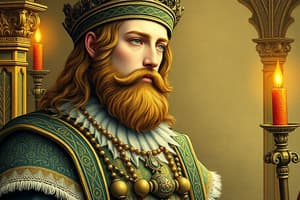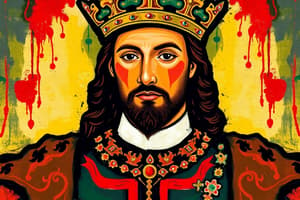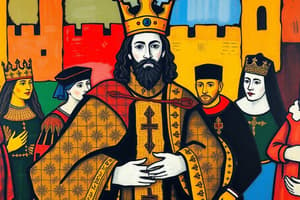Podcast
Questions and Answers
What role did Shakespeare's plays serve during Henry VII's time?
What role did Shakespeare's plays serve during Henry VII's time?
Shakespeare's plays were a powerful tool for mass education of the population.
What did Henry Tudor's tutor, Andreas Scotus, say about him?
What did Henry Tudor's tutor, Andreas Scotus, say about him?
He remarked that he had never seen a boy of such quickness and capability of learning at that age.
How did the political situation in France contrast with that in England during Henry's early life?
How did the political situation in France contrast with that in England during Henry's early life?
While England faced infighting among feudal lords, France experienced dramatic development under Louis XI.
Who primarily cared for Henry Tudor after his father's death?
Who primarily cared for Henry Tudor after his father's death?
What accolades did Polydore Virgil attribute to Henry Tudor's character?
What accolades did Polydore Virgil attribute to Henry Tudor's character?
What was the Milanese ambassador's perspective on Henry Tudor's approach to others?
What was the Milanese ambassador's perspective on Henry Tudor's approach to others?
What was Henry Tudor's constitutional inclination regarding war?
What was Henry Tudor's constitutional inclination regarding war?
How did Henry Tudor demonstrate his commitment to justice?
How did Henry Tudor demonstrate his commitment to justice?
What significant action did Henry VII take to consolidate power after defeating Richard III?
What significant action did Henry VII take to consolidate power after defeating Richard III?
How did Henry VII's approach to ruling England differ from that of previous monarchs?
How did Henry VII's approach to ruling England differ from that of previous monarchs?
What was the impact of Henry VII’s pardoning of his opponents following the Battle of Bosworth?
What was the impact of Henry VII’s pardoning of his opponents following the Battle of Bosworth?
Who was John Morton and what role did he play during Henry VII's reign?
Who was John Morton and what role did he play during Henry VII's reign?
What was the significance of Henry VII governing 'after the French fashion'?
What was the significance of Henry VII governing 'after the French fashion'?
How did Morton contribute to the development of infrastructure during his time?
How did Morton contribute to the development of infrastructure during his time?
What did Thomas More later say about John Morton?
What did Thomas More later say about John Morton?
How did the presence of nobles at court during Henry VII's reign compare to their actual power?
How did the presence of nobles at court during Henry VII's reign compare to their actual power?
How did Henry VII's approach to monarchy differ from that of the feudal nobility?
How did Henry VII's approach to monarchy differ from that of the feudal nobility?
What role did Richard Fox play in Henry VII's administration?
What role did Richard Fox play in Henry VII's administration?
What significant change did Henry VII introduce to the conception of law in England?
What significant change did Henry VII introduce to the conception of law in England?
What was the purpose of the oath taken by the Lords and House of Commons on November 19?
What was the purpose of the oath taken by the Lords and House of Commons on November 19?
How did the Magna Carta influence the relationship between the king and the nobles?
How did the Magna Carta influence the relationship between the king and the nobles?
What were the consequences of Henry VII raising the crown above the nobles?
What were the consequences of Henry VII raising the crown above the nobles?
In what ways did Henry VII promote the middle class during his reign?
In what ways did Henry VII promote the middle class during his reign?
What limitations did the Magna Carta impose on the king regarding trade?
What limitations did the Magna Carta impose on the king regarding trade?
What does Erasmus suggest is necessary for a Christian to transcend the physical realm?
What does Erasmus suggest is necessary for a Christian to transcend the physical realm?
How does Erasmus define true nobility?
How does Erasmus define true nobility?
What educational approach did Erasmus, Colet, and More advocate for in their teaching methods?
What educational approach did Erasmus, Colet, and More advocate for in their teaching methods?
What was the significance of St. Paul's School in the context of English education?
What was the significance of St. Paul's School in the context of English education?
Why was Erasmus's arrival in England during Henry VII's reign notable?
Why was Erasmus's arrival in England during Henry VII's reign notable?
What role did John Colet play in the advancement of education during this period?
What role did John Colet play in the advancement of education during this period?
How did More demonstrate the potential for girls' education in his teachings?
How did More demonstrate the potential for girls' education in his teachings?
What was a common challenge faced by Erasmus and his collaborators in promoting their educational reforms?
What was a common challenge faced by Erasmus and his collaborators in promoting their educational reforms?
Who did Colet select when Erasmus declined to write a curriculum?
Who did Colet select when Erasmus declined to write a curriculum?
What was the main focus of Erasmus's De Ratione Studii regarding language learning?
What was the main focus of Erasmus's De Ratione Studii regarding language learning?
What type of dialogues did Erasmus use in his educational writings?
What type of dialogues did Erasmus use in his educational writings?
Why did Colet reject the teaching of logic in his educational method?
Why did Colet reject the teaching of logic in his educational method?
What significant transformation occurred in literacy rates by 1615 in England?
What significant transformation occurred in literacy rates by 1615 in England?
What major educational influence did the Massachusetts Puritans bring to America?
What major educational influence did the Massachusetts Puritans bring to America?
What was the official Latin Grammar textbook drafted by Colet, Lily, and Erasmus used for?
What was the official Latin Grammar textbook drafted by Colet, Lily, and Erasmus used for?
How did St. Paul's School contribute to the transformation of education during Henry VIII's reign?
How did St. Paul's School contribute to the transformation of education during Henry VIII's reign?
What actions did Richard III take soon after becoming regent?
What actions did Richard III take soon after becoming regent?
How did Henry Tudor's background in France benefit him upon his return to England?
How did Henry Tudor's background in France benefit him upon his return to England?
What significant event marked the transition from Richard III to Henry VII?
What significant event marked the transition from Richard III to Henry VII?
How did Shakespeare portray Thomas More in relation to wealth and power?
How did Shakespeare portray Thomas More in relation to wealth and power?
What decline did Europe experience during Henry VII's time, according to the text?
What decline did Europe experience during Henry VII's time, according to the text?
In what way was Henry VII considered a 'new type of ruler'?
In what way was Henry VII considered a 'new type of ruler'?
What role did Shakespeare's works play in the education of the population?
What role did Shakespeare's works play in the education of the population?
What maxim did More suggest regarding power and greatness?
What maxim did More suggest regarding power and greatness?
Flashcards
Henry Tudor's education
Henry Tudor's education
Details about Henry Tudor's education are scarce. However, his tutor, Andreas Scotus, noted his exceptional learning abilities at a young age.
Henry Tudor's exposure to France
Henry Tudor's exposure to France
Henry Tudor witnessed the significant changes happening in France under Louis XI, where industrial, scientific, and technological advancements led to a doubling of national output in 22 years.
Henry Tudor's relationship with his uncle, Jasper Tudor
Henry Tudor's relationship with his uncle, Jasper Tudor
Henry Tudor's uncle, Jasper Tudor, was a significant figure in his life. Jasper fled England to Louis XI's court in France, providing Henry with exposure to the French court and its advancements.
Polydore Virgil's description of Henry Tudor's character
Polydore Virgil's description of Henry Tudor's character
Signup and view all the flashcards
Henry Tudor's political approach
Henry Tudor's political approach
Signup and view all the flashcards
The Milanese ambassador's view of Henry Tudor
The Milanese ambassador's view of Henry Tudor
Signup and view all the flashcards
Shakespeare's plays and mass education
Shakespeare's plays and mass education
Signup and view all the flashcards
Henry VII's impact on the nation-state model
Henry VII's impact on the nation-state model
Signup and view all the flashcards
Henry VII's Character
Henry VII's Character
Signup and view all the flashcards
Richard Fox's Role
Richard Fox's Role
Signup and view all the flashcards
Henry VII's Approach to Rule
Henry VII's Approach to Rule
Signup and view all the flashcards
Henry VII's Legal Reforms
Henry VII's Legal Reforms
Signup and view all the flashcards
Magna Carta's Purpose
Magna Carta's Purpose
Signup and view all the flashcards
Magna Carta's Provisions
Magna Carta's Provisions
Signup and view all the flashcards
Magna Carta and the Nation-State
Magna Carta and the Nation-State
Signup and view all the flashcards
Magna Carta's Legacy
Magna Carta's Legacy
Signup and view all the flashcards
Henry VII's Consolidation of Power
Henry VII's Consolidation of Power
Signup and view all the flashcards
The 'French Fashion' of Governing
The 'French Fashion' of Governing
Signup and view all the flashcards
Henry VII's Council
Henry VII's Council
Signup and view all the flashcards
Nobility's Diminished Power
Nobility's Diminished Power
Signup and view all the flashcards
John Morton: Key Advisor
John Morton: Key Advisor
Signup and view all the flashcards
Morton's Vision for the Fens
Morton's Vision for the Fens
Signup and view all the flashcards
Thomas More's Perception of Morton
Thomas More's Perception of Morton
Signup and view all the flashcards
Henry VII's Legacy of Stability
Henry VII's Legacy of Stability
Signup and view all the flashcards
Erasmus's View on Spiritual Growth
Erasmus's View on Spiritual Growth
Signup and view all the flashcards
Erasmus's Ideal Citizen
Erasmus's Ideal Citizen
Signup and view all the flashcards
True Nobility According to Erasmus
True Nobility According to Erasmus
Signup and view all the flashcards
Erasmus's Method of Education
Erasmus's Method of Education
Signup and view all the flashcards
Erasmus's Impact on English Education
Erasmus's Impact on English Education
Signup and view all the flashcards
Colet's Influence at Oxford
Colet's Influence at Oxford
Signup and view all the flashcards
St. Paul's School: A Model for Reform
St. Paul's School: A Model for Reform
Signup and view all the flashcards
Erasmus and the Legacy of Education
Erasmus and the Legacy of Education
Signup and view all the flashcards
Erasmus's Educational Philosophy
Erasmus's Educational Philosophy
Signup and view all the flashcards
Colet's Rejection of Logic
Colet's Rejection of Logic
Signup and view all the flashcards
Lily's Role in Education Reform
Lily's Role in Education Reform
Signup and view all the flashcards
Erasmus's Educational Works
Erasmus's Educational Works
Signup and view all the flashcards
St. Paul's School: A Model for Change
St. Paul's School: A Model for Change
Signup and view all the flashcards
Impact of St. Paul's on Education
Impact of St. Paul's on Education
Signup and view all the flashcards
Literacy Rates in England
Literacy Rates in England
Signup and view all the flashcards
Erasmian Education in America
Erasmian Education in America
Signup and view all the flashcards
House of York vs. House of Lancaster
House of York vs. House of Lancaster
Signup and view all the flashcards
Richard III's Seizure of Power
Richard III's Seizure of Power
Signup and view all the flashcards
Richard III's unpopular rule
Richard III's unpopular rule
Signup and view all the flashcards
Henry Tudor's Rise to Power
Henry Tudor's Rise to Power
Signup and view all the flashcards
The Impact of Henry VII's Reign
The Impact of Henry VII's Reign
Signup and view all the flashcards
Henry VII's Wise Advisors
Henry VII's Wise Advisors
Signup and view all the flashcards
The Venetian Influence
The Venetian Influence
Signup and view all the flashcards
Sir Thomas More's Ideal Citizen
Sir Thomas More's Ideal Citizen
Signup and view all the flashcards
Study Notes
Six Hundred Years Ago
- A handful of individuals revolutionized statecraft by creating the sovereign nation-state.
- King Louis XI (r. 1464-85) established the first nation-state in France.
- Henry VII (r. 1485-1509) established the second in England.
- These governments were monarchies, not republics.
American Republics
- Americans often associate republics with self-government through representative elections.
- Establishing self-government presents a paradox.
- Can people effectively govern themselves?
- Good government isn't merely about creating good institutions; it's about maintaining them.
The English Nation-State
- Pre-Henry VII England was characterized by a population (95%) living in impoverished conditions similar to serfs.
- Life expectancy was low, around 30 years.
- The population was roughly 2.25 million.
- England was dominated by a relatively small number of powerful families.
- They often held more power than the king's own government.
- Shakespeare's plays were crucial in educating the population about the principles of self-governance.
The Hundred Years' War
- The English monarchy (under the Plantagenets) was involved in continuous conflicts across Europe.
- The English attempted to create a nation-state against opposition from Venice.
- The war frequently led to economic contraction in Europe (e.g. the Black Death).
Shakespeare's Plays
- Shakespeare's plays covered English history from King John to Henry VIII.
- They explored the conflicts and crises of the nation's political leadership and questionable leadership. (Kings)
- These plays conveyed the relationship between rulers and the population, highlighting the need for good government.
- They promoted democratic education.
Henry VII's Reign
- During Henry VII's reign, England experienced a fundamental shift.
- It moved away from feudalism towards a government focused on national economic development.
- Henry VII's actions aimed to increase the productivity and living standards of the population through infrastructure and technology improvements.
- He made the monarchy more powerful (centralized).
- He focused on the development of English industries, such as shipbuilding, metalworking, and cloth manufacturing.
- His policies successfully created a stable, wealthy nation.
- More emphasis on education to help achieve the goal of general welfare.
The Renaissance
- The work of humanists like Erasmus of Rotterdam and Thomas More significantly supported the educational changes that led to improved governance.
The Magna Carta
- The Magna Carta was a charter that established the rights of nobles.
- It was not in agreement with the English monarchy.
- It aimed to limit the king's power and placed the ruling power in the hands of nobles. (opposed to the king)
Henry VII's Religious Policies
- Henry VII maintained a relatively tolerant stance towards Catholicism and other religions.
- This policy fostered peace.
- He consolidated power in himself and the nation-state.
The King's Role in the Economy
- Henry VII prioritized the general welfare of the population.
- He implemented new laws to control prices, wages, and commerce.
- He established new courts and a system for legal appeals.
Studying That Suits You
Use AI to generate personalized quizzes and flashcards to suit your learning preferences.
Related Documents
Description
Explore the intricate relationship between Henry VII's reign and the role of Shakespeare's plays during this period. This quiz delves into the political landscape of England and France, key figures who influenced Henry, and the constitutional changes he enacted. Test your knowledge on the significant events and character attributes associated with Henry Tudor.




